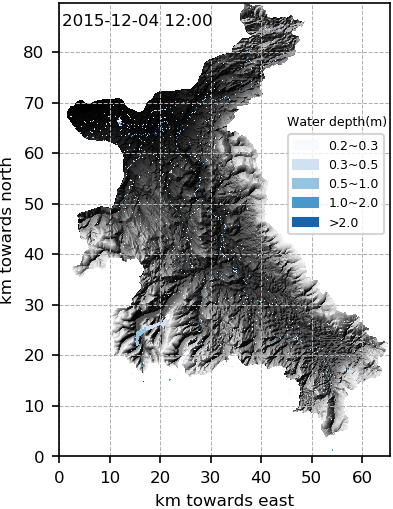You may not be aware, but all researchers at the University of Birmingham can request access to our Tier-2 (national) supercomputer, Baskerville. Dr Xilin Xia from the School of Civil Engineering describes below how Baskerville is essential for his research into predicting flooding…

What is your research about?
Due to Climate Change, we are seeing increasingly more extreme weather all around the world. Extreme weather events can cause natural hazards such as flooding, landslides, and debris flows, causing enormous damage each year and posing significant threats to people and infrastructure.
I am an Assistant Professor in Resilience Engineering in the School of Engineering. My work has been focusing on developing computational models of natural hazards and trying to understand and predict their impacts so that we can mitigate them. For example, the models I have been developing can generate maps showing where there is flooding and what are the depths and velocities, so that we know which place is most at risk. To enable more effective mitigation measures such as flood early warning, I have been developing new algorithms and utilising state-of-art computing technologies to make the models run faster whilst at the same time being able to give more details in terms of spatial coverage and resolution. The open-source model pypims that I am developing has attracted users from many different countries including UK, US, Japan, Germany, and China in both academia and industry.

Why was Baskerville chosen?
Because the model is based on numerically solving partial differential equations, the model is costly to run, which makes it extremely difficult to run large-scale and high-resolution simulations. Thankfully, modern Graphic Processing Units (GPUs) have made it possible. GPUs were initially designed exclusively for three-dimensional image rendering that is not complex but highly computationally intensive. In recent years, they have also been used for general-purpose computing such as running computational fluid dynamics simulations or training neural networks. They can accelerate the code hundreds of times. With GPUs, flood models can simulate a flood event over an entire city or catchment in just a few hours. Therefore, most of my code is written using CUDA to support GPU computing.
Before joining the University of Birmingham as an Assistant Professor, one thing I thought was essential was a GPU-based high-spec server to support the work of my team. But soon I discovered that Birmingham hosts the new Tier-2 HPC Baskerville, which has 208 latest NVIDIA A100 GPUs! And the university offers free access to all researchers (staff and students). I didn’t have to apply for an EPSRC grant to or fill in an excessively long application form to use it. Baskerville also offers interactive running mode, in which I can request a node for certain hours to test and debug the code.
In summary, Baskerville has been useful in supporting the whole workflow of my research. Six months after joining the university, I have submitted a new paper about hydrodynamic modelling of debris flows.
How has Baskerville been useful?
Baskerville has been essential for my research. I have been using it to develop and test my code, run large volumes of simulations and process large datasets. Baskerville can be used quite flexibly in several different ways. For running large volumes of simulations or crunching large datasets, the tasks can be submitted to the queue and [you then] wait for it to finish. But in other situations, such as debugging the code, a Jupyter notebook session can be launched from the Baskerville OnDemand portal, where the results can be visualised in the web browser. By connecting directly to external services such as the JASMIN, datasets such as the weather and climate data can be downloaded directly to Baskerville and analysed on it.
In summary, Baskerville has been useful in supporting the whole workflow of my research. Six months after joining the university, I have submitted a new paper about hydrodynamic modelling of debris flows.
We were so pleased to hear of how Xilin is able to make use of what is on offer from Advanced Research Computing, particularly to hear of how he has made use of the Baskerville – if you have any examples of how it has helped your research then do get in contact with us at bearinfo@contacts.bham.ac.uk. We are always looking for good examples of use of High Performance Computing to nominate for HPC Wire Awards – see our recent winners for more details.
